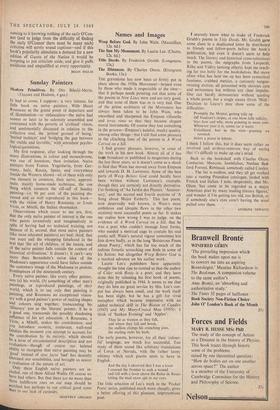IF I were really Chancellor I would resign rather than
hand out the dreary 'mixture as before' prescribed by these short-sighted practitioners at the Treasury. Diagnose an 'overload' on the economy (a questionable diag- nosis) and they will order a severe dose of deflation without a moment's thought. In the present case the dose is twice as strong as that ordered by Mr Thorneycroft because in addition to a 7 per cent. Bank rate there is Mr. Lloyd's new regulator—a 10 per cent. surcharge on purchase taxes and on customs and excise duties. (No mention of the futile pay-roll tax.) This will put up the Budget surplus above-the- line from £500 to over £630 million—with cuts in expenditure below-the-line of about £125 'million to be added. Just in case that is not sufficient to bring the temperature of the economy down from boom to slump the Govern- ment is calling for another 1 per cent. in special deposits from the joint stock banks and asking them to cut down advances for consumption and .property development and other speculative pro- positions. No doubt the Treasury officials are rubbing their hands with glee at getting Mr. Lloyd to order such a stiff and unpopular dose of defla- tion, but I can assure them they will be wringing them with grief next year over the next devalua- tion of the £. For one thing is certain. The rise in the domestic price level which these measures ensure, in particular the rise in rents and the in- creasing shortage of council houses, will so en- rage the trade unions that the demands for higher wages will be intensified rather than diminished (taking it out of the teachers is a meanness which will make it worse), while the push given to the rise in industrial costs will make our goods less competitive than ever in foreign markets.
Mr. Lloyd missed his great opportunity. Here was a chance to stop wages rising ahead of pro- ductivity by bringing the two sides of industry together in an imaginative appeal for co-operation in joint industrial planning. If he had imposed a limitation on dividends for a year he could have had wage restraint. But dividend limitation was apparently contrary to the Conservative idea of free capitalism and even planning is still taboo in Old Etonian circles. The only concession Mr. Lloyd made was to co-ordinate the work of the two benign but utterly ineffective bodies—the Economic Planning Board at the Treasury and the National Production Advisory Council. He has, it is true, condescended to discuss with both sides of industry the implications of his new target—an annual increase of 3 per cent. in the gross national product, which, he said, was only feasible if we have a 6 per cent. annual rise in exports—but discussions, Mr. Lloyd, are not enough! You should have set up an In- dustrial Development Council composed of employers, workers and technicians empowered to investigate each industry and draw up plans for reconstruction and, what is more, issue development certificates where modernisation is called for which would be encashable at the Treasury by way of loans. And you should have got the Treasury to acquire an equity interest in every company it has to finance so that the em- ployees should feel that the profits do not go entirely to the shareholders. That is how to fire the workers' imagination and get their help in saving their country from bankruptcy.
Alas! Mr. Lloyd has widened the fatal divi- sion in the nation and I fear his party will never be able to bridge it as long as he is Chancellor. For he will go down to history as the man who tried to reduce the standard of living of the workers while raising the standard of living of the surtax-payers. His last-minute promise to intro- duce a capital gains tax next April on short-term speculations will impress no one after his state- ment in the Commons that the 'best brains' in the country will be waiting to find ways of evad- ing it—a statement which insulted his own party for its best brains are as shocked by the division in the nation which he is widening as every one else.
The pity of it all is that Mr. Lloyd's crisis is soluble if he were to go about it the right way.


































 Previous page
Previous page